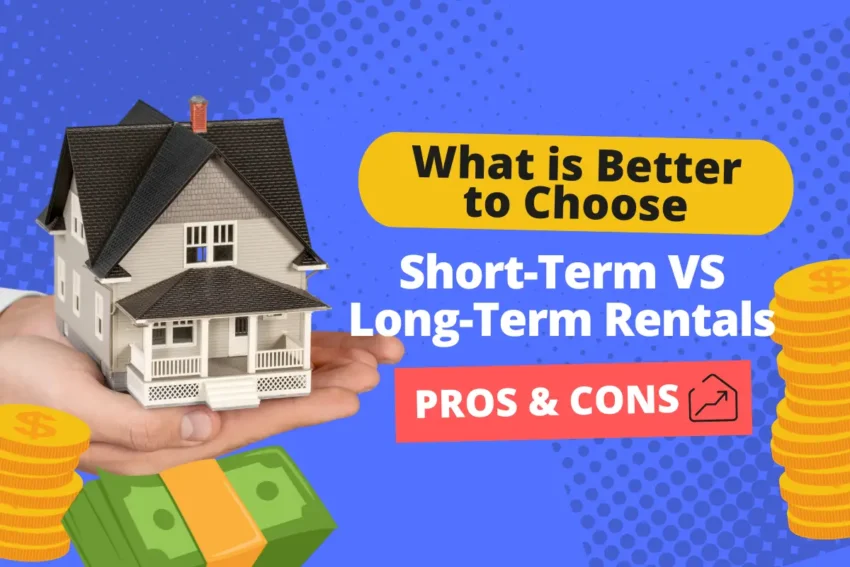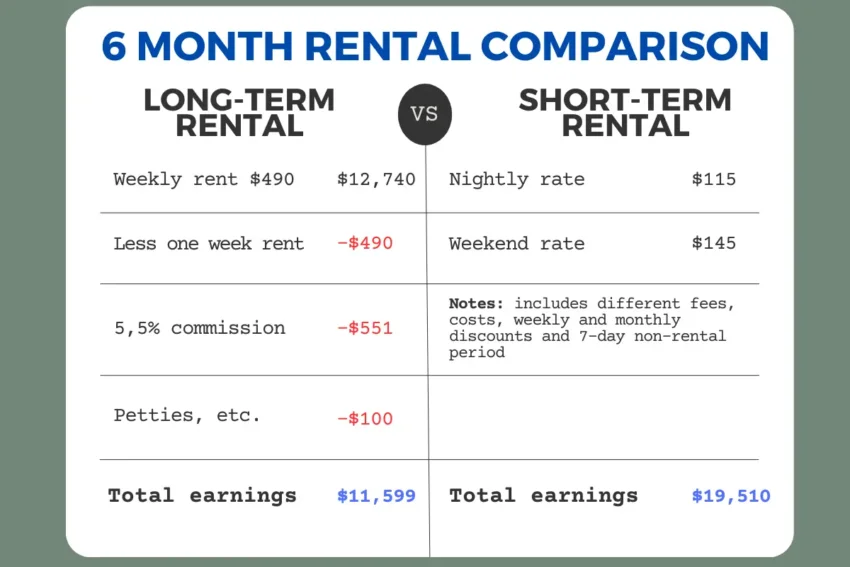Short-Term VS Long-Term Vacation Rental: Main Pros and Cons & What is Better to Choose in 2025
The topic of short-term vs long-term rental is on the top of discussions among property owners. Short-term rentals used to be an activity only for hotels. Over time they expanded and now we can find them everywhere, in almost any type of property, even a castle. Platforms like Airbnb and VRBO have made it incredibly easy for this to happen.
Why has this become so popular? What is the difference between a short rental and a long rental? If you own a rental unit, what is more convenient for you?

Pros and cons of short-term vs long-term rental
What exactly is a short-term rental?
Usually, s short-term rental is a rental of less than 6 months. But in most cases, these rentals last for around a few days or weeks. A short-term rental agreement can be entered into directly with a landlord or through a platform like Airbnb.
This type of rental can be a problem in many cities, especially those with high tourist activity. They want to level the playing field and allow the local hotel industry to survive, but short-term rentals disrupt housing markets in several ways.
- Short-term rentals can lead to a decrease in available long-term rental housing stock as landlords may find it more profitable to offer properties on a short-term basis to tourists rather than residents. It can drive up rental prices and limit housing options for locals.
- Short-term rentals can sometimes cause disruptions in residential neighborhoods, as tourists may behave differently than long-term residents, leading to noise, increased traffic, and decreased sense of community.
- Local hotels and traditional hospitality businesses may suffer from unfair competition, as short-term rentals can often offer lower prices and more flexible accommodation options. This can negatively impact the local hotel industry and result in job losses in the hospitality sector.
- Many cities have struggled to effectively regulate short-term rentals, leading to challenges in ensuring compliance with local laws, such as safety regulations, zoning restrictions, and taxes. This can create a lack of accountability and potential safety risks for guests.
To address these issues, many cities have implemented or considered various regulations to level the playing field between short-term rentals and the hotel industry. Some common approaches include:
- Requiring hosts to obtain permits to operate short-term rentals and imposing restrictions on the days a property can be rented out.
- Designating areas where short-term rentals are allowed and prohibiting them in residential zones.
- Imposing local taxes on short-term rentals to generate revenue for the city and support the local hotel industry.
- Collaborating with short-term rental platforms to share data on hosts and their listings to facilitate enforcement and compliance with local regulations.
- Holding hosts accountable for the behavior of their guests and imposing penalties for violations.
These regulations often aim to balance supporting the tourism industry and preserving the availability and affordability of long-term housing for residents. Finding the right balance can be challenging, and the approach can vary from city to city depending on their unique circumstances and needs.
What is a long-term rental?
A long-term rental is anything longer than six months and generally extends from six to twelve months. These agreements are usually made directly between the tenant and the landlord. The owner sets specific conditions and the tenant must comply with them. The tenant can leave the property at the end of the tenancy or extend it.
Key features of long-term rentals
| Aspect | Description |
|---|---|
| Definition | A long-term rental refers to the leasing or renting a property or asset for an extended period, typically 6 months to several years. |
| Duration | Typically, long-term rentals last 6 months or more, with some agreements extending to one year or multiple years. |
| Property type | Long-term rentals include residential properties (apartments, houses), commercial spaces, vehicles, and equipment. |
| Payment | Rent is usually paid monthly, and in some cases, tenants may be required to provide a security deposit upfront. |
| Flexibility | Long-term rentals provide stable housing or use of an asset over an extended period, offering less flexibility to move or change equipment. |
| Tenant rights | Tenants in long-term rentals usually have rights outlined in a lease agreement, including property usage and maintenance responsibilities. |
| Landlord role | Landlords are responsible for property maintenance, repairs, and ensuring compliance with rental agreements. |
| Advantages | Stability, consistent housing or asset access, potential for lower monthly rates, and the ability to personalize space. |
| Disadvantages | Limited flexibility, commitment to a specific location, potential rental increases during the lease, and difficulty breaking the contract early. |
Short-term vs long-term rental: advantages & disadvantages
Short-term rentals offer several advantages over traditional long-term rentals, making them a more convenient option for certain situations. Here are some reasons why short-term rentals can be more favorable.
Advantages of short-term rentals
- Wide selection. The properties on Airbnb can be incredibly varied. They can range from a room, a set of rooms and apartments, to entire houses, yachts, and even a castle.
- Free listings. You should pay absolutely nothing to list your property. The platform allows you to include a description, photos, and a user profile where guests can learn about the hosts.
- Hosts can set their own price. It’s up to each host to decide how much to charge per night, per week, or per month.
- Guest and host protections. As a protection for guests, Airbnb holds a guest payment for 24 hours after check-in before releasing funds to the host.
- For hosts, Airbnb’s Host Guarantee program “protects up to $1,000,000 in covered property damage in the rare event of damage to guests, in eligible countries.”
- High incomes. Unlike the standard annual yield of 6% on the value of a property offered by traditional rentals, in temporary rentals, you can obtain double the yield (12%), always taking into account the location of the property, the characteristics, the market and if it is attractive enough for the user.
- Promotion support. Temporary rental platforms are highly effective in attracting tenants. It is because their business is based solely on providing this online service in the best possible way. This means you can forget about the advertising and promotional aspect, which can be exhausting and expensive.
- Flexibility. With a temporary rental, you can use it or sell it in the short term, unlike traditional rentals, where you must wait for the lease to end.
Suppose you want to consult on short-term rentals, particularly those related to Airbnb, VRBO, and Booking.com. In that case, you can contact the team of professionals from CHM, who have over 10 years of experience in this field, and get working advice and recommendations for your vacation rental business.
Disadvantages of short-term rentals
Absolutely, short-term rentals do come with certain challenges and risks that property owners and hosts need to be aware of. Here are some of the key challenges and risks associated with short-term rentals:
- Administrative costs. Although the profitability is higher when a short-term rental is made, the commission prices are a little higher when the platforms for temporary rentals are used.
- Maintenance cost. Constant use and different tenants cause the furniture to wear out faster; keeping the property well-decorated and updated furniture will increase the rental price and the occupancy rate.
- More time invested. If you decide to manage the property yourself, you must fine-tune every detail, from cleaning to maintenance. However, there is the option of hiring someone to manage your properties; in this way, you would gain peace of mind but it will increase your costs a bit.
While short-term rentals offer several benefits, their success depends on various factors, including location, property quality, pricing strategy, and effective management. Property owners must assess their circumstances, financial goals, and risk tolerance before deciding to invest in short-term rentals.
The advantages of long-term rentals
Long-term rentals have many advantages for landlords, and you should consider these when deciding which path to take.
- Stability is a primary benefit. You should be able to determine if you have a prospective excellent or bad renter in front of you if you exercise due diligence and carry out any background checks permissible under the law.
- Managing long-term rentals is also significantly simpler. You must handle the rent payments and some upkeep after you have a renter. Your renter is unlikely to become destructive if you suddenly choose them wisely. As a result, anticipating your charges will be much simpler.
- Not to add that, unless otherwise mentioned in the rental circumstances, utilities must be paid for by the renter.
The disadvantages of long-term rentals
Long-term rentals aren’t perfect. Since you’ll be stuck with the tenant, you need to think about the possibility of them rebelling. This may be due to changes in their personal or professional life.
- Even though it’s uncommon for an ideal renter to be problematic, evicting a tenant may be exceedingly challenging while the leasing agreement is still in effect.
- You cannot benefit from local pricing changes, which is another issue. If you reside in a very touristic region, modifying the pricing in a short-term rental would be simple to increase revenue. You should thus give that some thought.
- Be aware that dealing with long-term renters will subject you to greater legal duties as a landlord. You are in charge of finding them a decent location to live. This will be their permanent residence rather than simply a temporary place.
- You presumably already know that short-term rentals generate significantly larger rental income. Short-term rentals often generate 30% more rental revenue than long-term rentals.
- Most landlords report more significant yearly revenue with short-term rentals or a combination of short-term and long-term rentals than with long-term rentals.
If you want to join the short- or long-term rental business, the CHM Inc. team is ready to help you with it! We specialize in property management and do everything from A to Z. We will ensure you start making your profit in a month!
Short-term vs long-term rental: what is the best option?
Well, it depends on what you are looking for. To know the best duration, you should first look at your area.
- Seasonal rentals are not particularly practical in areas that are not highly popular with tourists.
- The state of your property is a further factor that must be considered. Airbnb users have particular standards for quality. So if you fall short of those standards or don’t know what they are, you can be dissatisfied with the feedback you receive.
- Short-term rentals are much more profitable than long-term ones. Sometimes the profit can be two or even three times more!
- Vacation rentals become a no-brainer if your house is in good shape and you live in a tourist-friendly city or region.
- To develop your reputation, you need to be knowledgeable in your field and take into account working with experts.

6-month rental comparison of short-term and long-term rentals
Short-term and long-term rentals should be considered by landlords who want to get the most money from their investments. They can be mixed and more effective for some properties than others. So consider your choices and decide which is best for you.
Conclusion
In the end, there are a variety of advantages to renting a holiday home, and this list is by no means complete. However, let’s assume you have the appropriate administration software for your seasonal rental before we discuss short-term vs long-term rentals. In such a situation, short-term renting is a smart move to increase income and flexibility while participating in the sharing economy, meeting visitors worldwide, and benefiting from tax breaks and other advantages.
Frequently asked questions about
short-term vs long-term rental
1. What is short and long term rent?
The main difference between short and long-term rent lies in the duration of the rental agreement, with short-term rentals providing temporary accommodation and long-term rentals offering more extended and stable housing options.
- Short-term rent refers to a rental agreement with a relatively brief duration, typically less than six months. It is commonly used for temporary stays, such as vacations, business trips, or short-term housing needs.
- Long-term rent refers to a rental agreement with an extended duration, often lasting for six months or more. It is typically chosen by individuals or families seeking a stable and more permanent living situation.
2. What is the difference between long and short leasehold?
The difference between long and short leasehold relates to the duration of the lease agreement and the rights and responsibilities of the leaseholder (also known as the lessee) over the property. These terms are commonly used in real estate and property law contexts. Let’s explore each:
- Long leasehold: Lasting decades or centuries, leaseholders have significant rights during the lease period, akin to freehold ownership. The property reverts to the landlord at the lease’s end.
- Short leasehold: Lasting from a few years to decades, it grants limited rights to the leaseholder with specific restrictions outlined in the lease. The property reverts to the landlord at the lease’s end, affecting its value.
The choice between long and short leaseholds depends on various factors, including the individual’s long-term plans, preferences, and the specific terms offered in each lease agreement. It’s advisable to seek professional advice when considering leasehold properties to fully understand the implications and make an informed decision.
3. What is the disadvantage of a short term lease?
The disadvantage of a short-term lease, such as a month-to-month lease or a lease with fewer than six months, is primarily related to the lack of long-term stability. Some of the key disadvantages include:
- With a short-term lease, there is less certainty about how long you can stay in the property. Landlords typically require only 30 days’ notice for termination, which means you may have to move more frequently, disrupting your living situation.
- Short-term leases may expose tenants to more frequent rent increases. Landlords can adjust the rent at the end of each lease term, leading to potential fluctuations in housing costs.
- Since short-term leases are renewed frequently, there may be limited opportunities for negotiation on rent or lease terms compared to longer-term leases.
- They may not provide the sense of stability and belonging that longer-term rentals can offer. Frequent moves can disrupt your routine and community connections.
- Short-term leases may be less common and harder to find in competitive rental markets, limiting your options.
- Vacation rentals, especially furnished apartments or corporate housing, are often more expensive monthly than long-term rentals.
- With a short-term rental, landlords may have stricter rules on decorating or personalizing the property, impacting how you feel at home.
Carefully weigh the pros and cons of short-term leases. If you value stability and predictability, a longer-term lease might be more convenient. However, if flexibility and the ability to move more frequently are essential to you, a short-term lease could be a better fit.
4. How short is a short term rental?
The length of a short-term rental can vary, but typically it is no more than six months. The common characteristic is that it is intended for temporary stays rather than long-term occupancy. We advise you to check with the specific rental property or platform to understand their definition of short-term and the minimum duration they allow for bookings.
5. Is rent a short or long-term liability?
From an accounting perspective, rent is classified as a short-term liability if it is expected to be paid within the current operating cycle of a business, which is typically one year. If the rent is due within the coming year, it will be categorized as a short-term liability on the balance sheet.
However, if the rent payment is for a term longer than one year, it is classified as a long-term liability. Long-term liabilities are obligations that are not due within the current operating cycle and are payable over an extended period, usually beyond one year.
It’s important to note that the specific accounting treatment may vary depending on the accounting standards used and the reporting requirements of a particular business. The categorization of rent as a short-term or long-term liability is crucial for financial reporting and financial analysis purposes.
6. What is the best lease length for an apartment?
The best lease length for an apartment depends on individual circumstances and preferences. There is no one-size-fits-all answer, as different lease lengths offer different advantages and disadvantages. Here are some considerations for various lease lengths:
- Short-term lease (month-to-month): A month-to-month lease provides flexibility, allowing you to leave the apartment with relatively short notice (usually 30 days). It suits those with uncertain plans or who expect to move soon.
- One-year lease: A one-year lease is a standard option, providing stability and often locking in the rent for the duration of the lease. It suits individuals or families looking for a stable living situation and prefers not to move frequently.
- Long-term lease (two or more years): A longer lease term can offer more extended stability and may be suitable for those who plan to stay in the area for an extended period or want to avoid potential rent increases.
When choosing a lease length, consider factors such as job stability, personal preferences, plans, and the local rental market. Read the lease agreement thoroughly, understand the terms, and discuss any concerns with the landlord before signing. Lease terms can often be negotiable, so if you have specific needs or preferences, don’t hesitate to discuss them with the landlord to find the best arrangement for both parties.
7. What is meant by long term rent?
Long-term rent, also known as a long-term rental, refers to a rental agreement in which a tenant rents a property for an extended duration, typically six months or longer. It is a housing arrangement where the tenant commits to staying in the property for an extended period, often yearly.
Long-term rent involves signing a lease with the landlord, specifying rental details like duration, monthly rent, and rules to protect both tenant and landlord rights during the rental period.
Long-term rentals are usually chosen by individuals or families who seek a stable and more permanent living situation. This type of housing option provides greater security and consistency than short-term rentals, allowing tenants to establish a sense of home and community in the area.
8. What does Airbnb consider a long term stay?
Airbnb considers a long-term stay to be 28 nights or more. The Airbnb platform categorizes states of 28 nights or longer as “Monthly Stays” on the Airbnb platform. Hosts often offer discounts for monthly stays as an incentive to attract guests who book for an extended period. These discounts can make the overall cost more affordable for guests looking for longer-term accommodations.
Airbnb’s policies and categorizations may change over time, so it’s a good idea to check the Airbnb website or contact Airbnb directly for the most up-to-date information on their definitions of short-term and long-term stays.
9. Is Airbnb cheaper if you stay longer?
Yes, in many cases, Airbnb rentals tend to be cheaper per night if you stay longer. Hosts often offer discounts for longer stays as an incentive to attract guests who book for an extended period. This can result in a lower average nightly rate compared to shorter stays. However, specific pricing can vary depending on the property, location, and other factors, so it’s advisable to check with the individual host to confirm their pricing structure for longer stays.
Updated on: . Author:






